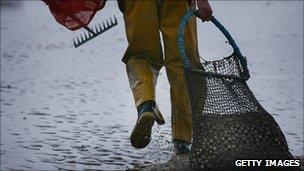Skull found in Morecambe Bay 'belongs to cockle-picker'
- Published

The 23 men and women were swept out to sea as they harvested cockles in the bay
A human skull discovered off the Lancashire coast belongs to one of the 23 cockle-pickers who drowned there in 2004, tests have revealed.
Fisherman Stephen Clarke came across the skull near Silverdale Point, on the edge of Morecambe Bay in July.
DNA tests have shown it is a match for Liu Qin Ying - a 37-year-old mother whose husband also died in the tragedy.
An inquest hearing to establish her cause of death is due to open on Wednesday, police have said.
Mr Clarke told the BBC he knew the skull was likely to be that of one of the cockle pickers as soon as he realised what he had found.
"I saw what looked like a set of false teeth upside down in the sand. I went to pick them up and I thought they're attached to something," he said.
"So we carefully dug around the skull and then realised it was a very small skull. And the teeth were very, very perfect so it was obviously a young person."
The victim's husband, 37-year-old Yu Hua Xu, also perished that night, leaving their son an orphan in China.
The deaths exposed an underground world of cheap labour in which vulnerable migrants were exploited by criminal gangs and human traffickers.
Mick Gradwell, who was the senior investigating officer on the investigation before his retirement, said the discovery would bring closure to the family.
"At the time they died their son Zhou was 13 years of age and its always been left bouncing in the air as to whether his mother died here in 2004," he told the BBC.
Just one of the cockle-pickers remains unaccounted for, after the discovery of the skull. Dong Xin Wu's body is still missing.
All 23 Chinese men and women were swept out to sea as they harvested cockles, against a rising tide in Morecambe Bay.
The man who sent them out on to the sands in February 2004 - gangmaster Lin Liang Ren - was given a 14-year prison sentence for manslaughter.
The disaster was one of the biggest police operations Lancashire police have handled in a decade.
Officers had to travel to China in an attempt to identify the dead, breaking the terrible news to families and leaving many without parents and loved ones.
Legislation was drawn up in a bid to stop this kind of disaster happening again.
The Gangmasters Licensing Act 2004 was established and there is an independent authority that regulates all aspects of the business.
Ian Livsey, chief executive of the Gangmasters Licensing Authority (GLA), has recently stressed the quango is not one of those that will be cut in the government's cull.
He said: "It is widely acknowledged that the GLA and the introduction of the licensing system has made an impact on protecting the most vulnerable workers and stamping out rogue operators who not only exploit workers but distort competition for legitimate businesses."
- Published14 July 2010